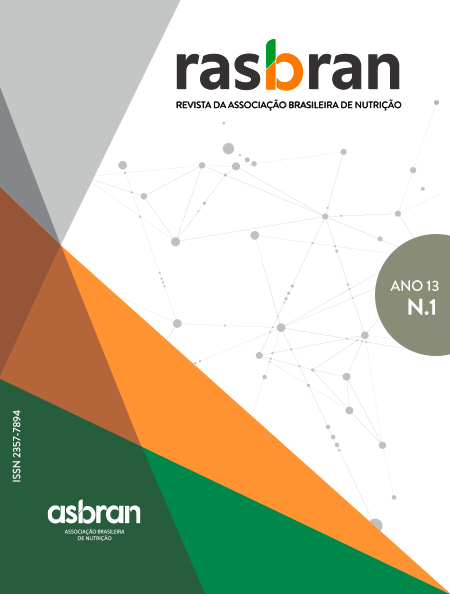Prevalence of the risk of refeeding syndrome in critically ill patients with SARS-CoV- 2 in a Brazilian hospital
DOI:
https://doi.org/10.47320/rasbran.2022.2356Abstract
Introduction: The refeeding syndrome is a serious complication, characterized by metabolic and electrolytic changes on reintroduction and / or caloric increase after a period of reduced / absent food intake, with a higher incidence in malnourished or geriatric patients, such as patients previously with coronavirus. This study identifies the prevalence of the risk of this syndrome in patients awake with coronavirus admitted to a Brazilian hospital. Methods: Retrospective, cross-sectional observational study of patients with coronavirus, by positive nucleic acid test, of critical units between March and June 2020. Demographic, clinical, nutritional, biochemical and clinical indications of refeeding syndrome were analyzed. Results: 328 patients, with mean age of 65.3 years (SD=16.7), 70.4% (n=231) male, with comorbidities such as 45.4% (n=149) hypertension, 29 , 9% (n=98) dyslipidemia, 27.7% (n=91) diabetes. In nutritional anamnesis, 50% (n=164) had low previous food acceptance and 12.2% (n=40) weight loss in the last 3 months. 65.2% (n=214), 34.1% (n=112) enteral, 0.6% (n=2) parenteral received oral diet. Mean onset of diet 1.5 days (SD=1.2). A prevalence of 58.2% of the risk of refeeding syndrome was identified. When related to refeeding syndrome and clinical signs, there was no association, identifying a trend towards phosphorus (p=0.086) and sodium (p=0.054). Conclusion: The results showed high prevalence of the risk of refeeding syndrome in the studied population, reinforcing the importance of this early identification and adequate nutritional therapy.
Downloads
Downloads
Published
How to Cite
Issue
Section
License
Copyright (c) 2022 Revista da Associação Brasileira de Nutrição - RASBRAN

This work is licensed under a Creative Commons Attribution 4.0 International License.
A Revista se reserva no direito de efetuar, se necessário, alterações de ordem normativa, ortográfica e gramatical, com vistas a manter o padrão culto da língua, respeitando, porém, o estilo dos autores.
Ao encaminhar os originais, os autores cedem os direitos de primeira publicação para a Revista da Associação Brasileira de Nutrição e aceitam que seu trabalho seja publicado de acordo com nossa Declaração de Direito Autoral.
Os documentos publicados serão atribuídos a licença 
Este trabalho está licenciado com uma Licença Creative Commons - Atribuição 4.0 Internacional.


